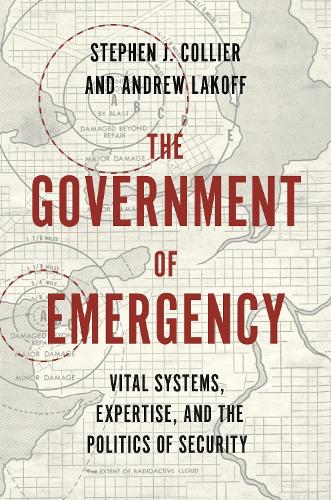
The Government of Emergency: Vital Systems, Expertise, and the Politics of Security
(Paperback)
Available Formats
Publishing Details
The Government of Emergency: Vital Systems, Expertise, and the Politics of Security
By (Author) Stephen J. Collier
By (author) Andrew Lakoff
Princeton University Press
Princeton University Press
15th February 2022
United States
Classifications
Tertiary Education
Non Fiction
Central / national / federal government policies
History of science
Social impact of disasters / accidents (natural or man-made)
Anthropology
353.95
Physical Properties
Paperback
480
Width 156mm, Height 235mm
Description
The origins and development of the modern American emergency state
From pandemic disease, to the disasters associated with global warming, to cyberattacks, today we face an increasing array of catastrophic threats. It is striking that, despite the diversity of these threats, experts and officials approach them in common terms: as future events that threaten to disrupt the vital, vulnerable systems upon which modern life depends.
The Government of Emergency tells the story of how this now taken-for-granted way of understanding and managing emergencies arose. Amid the Great Depression, World War II, and the Cold War, an array of experts and officials working in obscure government offices developed a new understanding of the nation as a complex of vital, vulnerable systems. They invented technical and administrative devices to mitigate the nations vulnerability, and organized a distinctive form of emergency government that would make it possible to prepare for and manage potentially catastrophic events.
Through these conceptual and technical inventions, Stephen Collier and Andrew Lakoff argue, vulnerability was defined as a particular kind of problem, one that continues to structure the approach of experts, officials, and policymakers to future emergencies.
The Government of Emergency is a truly compelling account of the consolidation of a new normative regime of government, one in which vital systems security is a permanent function of the everyday operations of the state. This book is a must-read for our understanding and appreciation of the governmental obligation to protect and sustain life, a crucial insight in this time of global pandemic.' Janet Roitman, author of Anti-Crisis
'This original, eye-opening book provides indispensable background to the hopeless, fallible, yet crucial work of coping with modernitys reflexive risks. Collier and Lakoff unearth the obscure federal agencies that gamed out survival strategies for Americas essential systems what we now call 'infrastructures' during the Great Depression, World War II, and the early Cold War.' Paul N. Edwards, author of A Vast Machine
Reviews
"A scholarly tour de force. . . . For those seeking specialization in the anthropology of crises, disasters, and emergencies, this book is required reading."---Roberto E. Barrios, American Anthropologist
"A monumental achievement."---Kathleen Tierney, American Journal of Sociology
Author Bio
Stephen J. Collier is professor of city and regional planning at the University of California, Berkeley. He is the author of Post-Soviet Social: Neoliberalism, Social Modernity, Biopolitics (Princeton). Andrew Lakoff is professor of sociology at the University of Southern California. He is the author of Unprepared: Global Health in a Time of Emergency.
